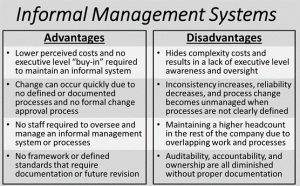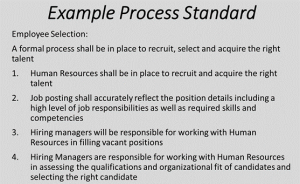In this article we will be covering what exactly makes a management system formal. Before we start it is important to align on the definition of a management system. A management system is the set of management processes a company uses to manage its people, value chain processes, and assets to achieve a particular outcome, or set of outcomes. It is vital to understand that every company has a management system with the main difference between one company’s system and the next primarily being the level of formality. So, the question is not whether your company has a management system, but instead whether your management system is formal or informal.
Informal Management Systems
 An informal management system is when a company’s management processes are not explicitly defined, documented, or purposefully managed. Some examples of the processes within a management system include Roles and Responsibilities, Training, Setting Priorities and Targets, Employee Selection, Audits, and Management of Change. So, is a failure to formalize all of these processes a bad thing? While it might not be time well spent for a small company with a few employees to create formal processes for all of the above, for larger organizations formalizing processes is essential. Consider if all of the earlier mentioned processes were only managed through word of mouth or documents that are not part of a defined framework. It would lead to unclear and overlapping requirements. It would be impossible for people to know what they are being measured against and result in growing inconsistency. Additionally, without assigned ownership, how do people know who is responsible and for what? With an informal management system, a company is forced to rely primarily on “good people doing good things.” As a company grows, this ability rapidly diminishes as visibility to what people are doing decreases and the number of things being done simultaneously increases.
An informal management system is when a company’s management processes are not explicitly defined, documented, or purposefully managed. Some examples of the processes within a management system include Roles and Responsibilities, Training, Setting Priorities and Targets, Employee Selection, Audits, and Management of Change. So, is a failure to formalize all of these processes a bad thing? While it might not be time well spent for a small company with a few employees to create formal processes for all of the above, for larger organizations formalizing processes is essential. Consider if all of the earlier mentioned processes were only managed through word of mouth or documents that are not part of a defined framework. It would lead to unclear and overlapping requirements. It would be impossible for people to know what they are being measured against and result in growing inconsistency. Additionally, without assigned ownership, how do people know who is responsible and for what? With an informal management system, a company is forced to rely primarily on “good people doing good things.” As a company grows, this ability rapidly diminishes as visibility to what people are doing decreases and the number of things being done simultaneously increases.
Formal Management Systems
A company has a formalized management system when they have defined, documented, and deliberately managed their management processes. Although this definition may seem pretty clear-cut, it is a common area of confusion. Many companies believe that management system formality is purely measured by having something documented. This is not the case. Although a company may have documentation – for example, a job posting template as part of an Employee Selection process – that alone does not equal formal. The missing pieces usually are that the processes are not defined and deliberately managed. What we mean by defined is a single framework consisting of mutually exclusive, collectively exhaustive (MECE) processes including auditable standards developed for each process. Below is an example of a defined process that would be found in a management system framework.
 This example for the Employee Selection process is representative of all the processes in the framework. During the development of a formal management system, standards are developed for each defined process. These standards then allow for clear requirements to be developed for all the processes necessary for a given company. This begs the question: Why is it so important for a company to define something that people may already be doing? The reason is that having processes documented, defined, and standardized gives management the tools they need to communicate expectations, ensure consistency, enable accountability, and continuously improve. This is something that undocumented or partially defined processes cannot achieve. Defining processes also allow for the assigning of owners to deliberately manage and further refine the processes. By deliberately manage we are referring to process owners who are accountable to actively monitor and improve their processes and the management system as a whole. In summary, a formal management system is only in place once a company has well defined processes with clearly stated requirements. The processes and requirements must be thought of as a whole as well as deliberately and actively managed. Processes previously managed individually without being thought of in these terms result in gaps or overlaps with other processes. Only through a formal management system can these processes be managed collectively in a MECE manner.
This example for the Employee Selection process is representative of all the processes in the framework. During the development of a formal management system, standards are developed for each defined process. These standards then allow for clear requirements to be developed for all the processes necessary for a given company. This begs the question: Why is it so important for a company to define something that people may already be doing? The reason is that having processes documented, defined, and standardized gives management the tools they need to communicate expectations, ensure consistency, enable accountability, and continuously improve. This is something that undocumented or partially defined processes cannot achieve. Defining processes also allow for the assigning of owners to deliberately manage and further refine the processes. By deliberately manage we are referring to process owners who are accountable to actively monitor and improve their processes and the management system as a whole. In summary, a formal management system is only in place once a company has well defined processes with clearly stated requirements. The processes and requirements must be thought of as a whole as well as deliberately and actively managed. Processes previously managed individually without being thought of in these terms result in gaps or overlaps with other processes. Only through a formal management system can these processes be managed collectively in a MECE manner.
Assessing the formality of your management system
Who determines if a management system is formal or informal? In most cases, the initial determination comes from within the company; however, this approach can many times cause more harm than good. The reason is, when a company assesses the status of their own management system they are more likely to see themselves as being closer to achieving a formal management system than actually is the case. Think of it as the inflation that occurs if someone was to grade their own work. This can put the company’s leadership in the dangerous position of thinking they have a high level of formality in their management system when in reality they do not. The only way for leadership to successfully mitigate this risk is to have an experienced and external management system expert conduct a management system assessment using a best in class OEMS as the benchmark.
At Wilson Perumal & Company we believe your management system should be an asset rather than a burden. When done correctly, a formal management system can help you improve your quality, profitability, safety, and environmental performance. WP&C offers free tools to help get you pointed towards the development of a formal management system.
